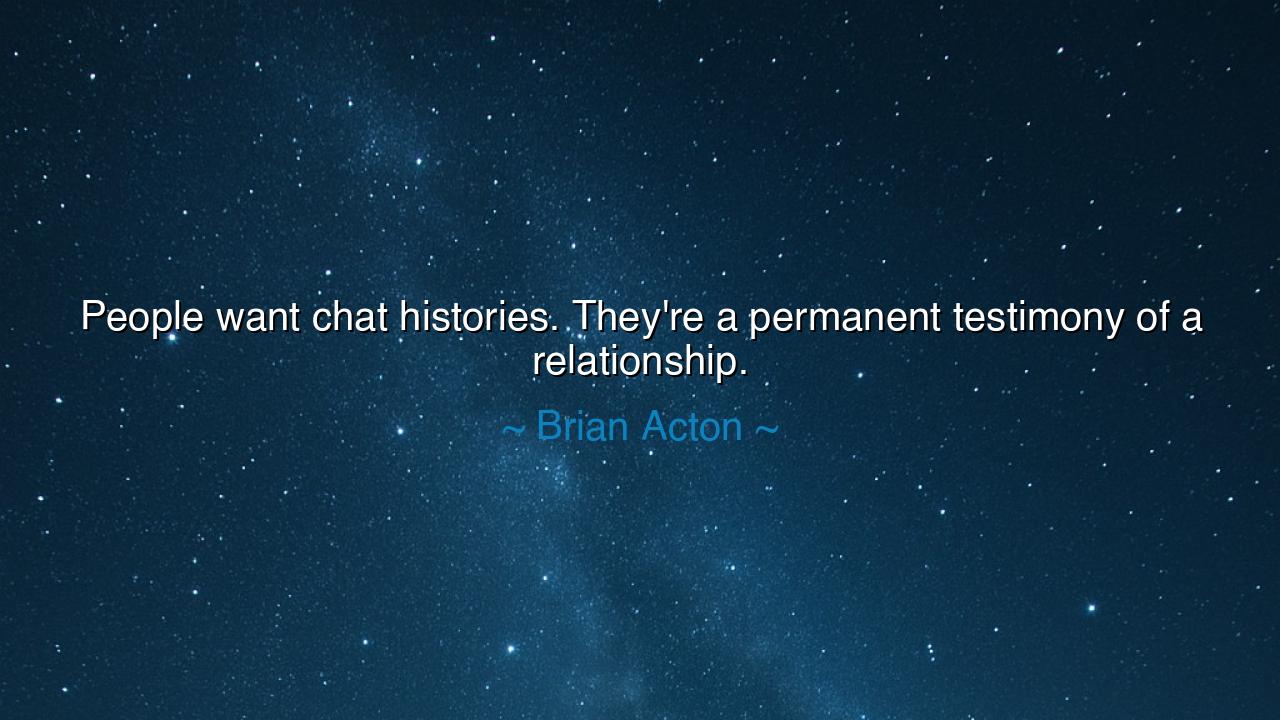
People want chat histories. They're a permanent testimony of a






Hear the words of Brian Acton, a craftsman of the digital age, who declared: “People want chat histories. They’re a permanent testimony of a relationship.” Though born of modern tools, his words carry the weight of timeless wisdom, for he speaks of memory, record, and the enduring bond between souls.
He reminds us that the desire for chat histories is not mere habit, but the yearning of the heart to preserve its connections. Just as the ancients carved their stories upon stone and parchment, so do men and women now carve their emotions into messages. Each word, though fleeting in the moment, becomes a piece of a greater tapestry—a witness to the joys, sorrows, and laughter once shared.
To call them a permanent testimony is to declare that these records stand as evidence of life lived together. They are proof of love expressed, of friendships built, of bonds tested and renewed. In a world where memory falters and the heart may waver, the written word remains, holding fast what the tongue has spoken and the spirit has felt.
And above all, Acton ties this testimony to relationship. For what is a relationship if not the weaving of shared moments, great and small? These messages are the footprints of that journey, reminding both the present and the future that connection was real, that voices once met across distance and time.
Thus, O seekers, learn this: to preserve words is to preserve the heart. The chat history may seem simple, yet it is a vessel of memory, a sacred testimony of bonds that shaped our days. In this, Acton reveals the ancient truth—that human connection, whether spoken by the fireside or typed across the ether, yearns always to endure. Would you like me to render this as a parable of the scribe, comparing the chat history to scrolls guarded in the temple of memory?






BMHuong Bui Mai
The concept of chat histories being a permanent testimony of a relationship is a double-edged sword. On one hand, it gives us the ability to look back at past moments and reflect on our relationships. On the other hand, does it make us more focused on the past rather than living in the moment? Shouldn’t the true essence of a relationship be about the present and future, rather than relying on past messages?
HVThai Son Hoang Van
Brian Acton’s perspective makes me question the role of digital communication in forming real relationships. Are we giving too much weight to the permanence of chat histories? While they can hold sentimental value, can they truly capture the essence of a relationship, or do they sometimes miss the emotional and personal context that only real-time interactions can provide? How do we navigate the space between the digital and the personal?
NTPhuong Thao Nguyen Thi
I’m curious—what happens when people look back at their chat histories? Do they see those conversations as fond memories or moments of regret? Could chat histories, in a way, trap people in the past, forcing them to relive conversations that might not represent their current feelings or thoughts? Are we setting ourselves up for confusion if we treat chat histories as a full representation of a relationship?
HVHa Vu
It’s interesting to think about the permanence of chat histories. But how much should we really rely on them to represent a relationship? Aren’t relationships built on personal experiences and face-to-face interactions, not just digital text? Could the reliance on chat histories lead to misunderstandings, as some emotions or meanings might not come through in written form? What does it say about the way we communicate in the digital age?
HVTran Thi Hong Van
I find this quote intriguing, especially considering how easy it is to erase or delete digital conversations nowadays. What does the permanent nature of chat histories say about how we view our connections with others? Are people more cautious about what they say now because they know these messages could last forever, or do chat histories create an unhealthy sense of accountability that stifles real communication?